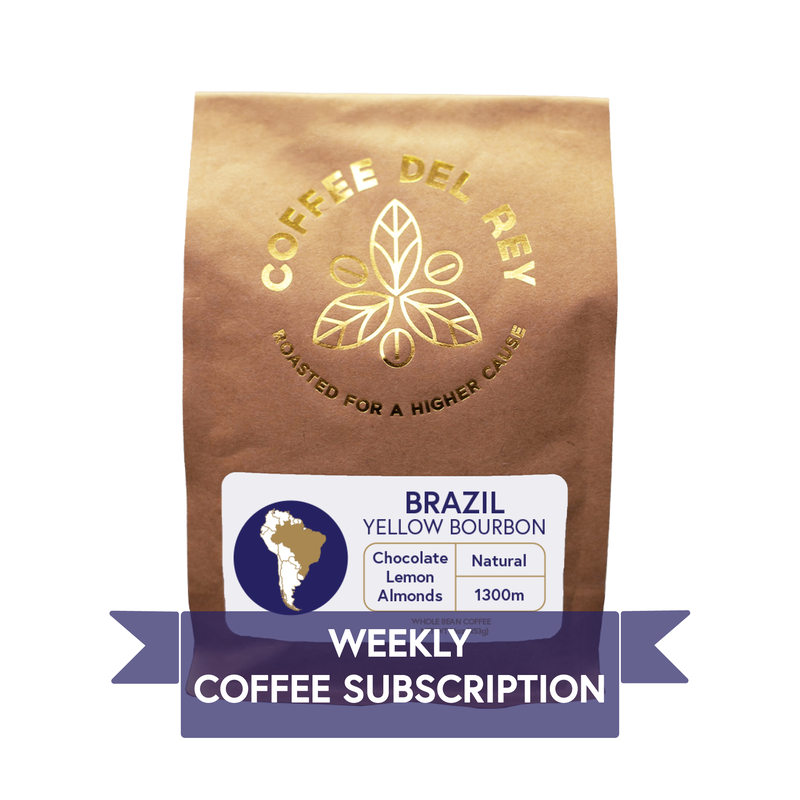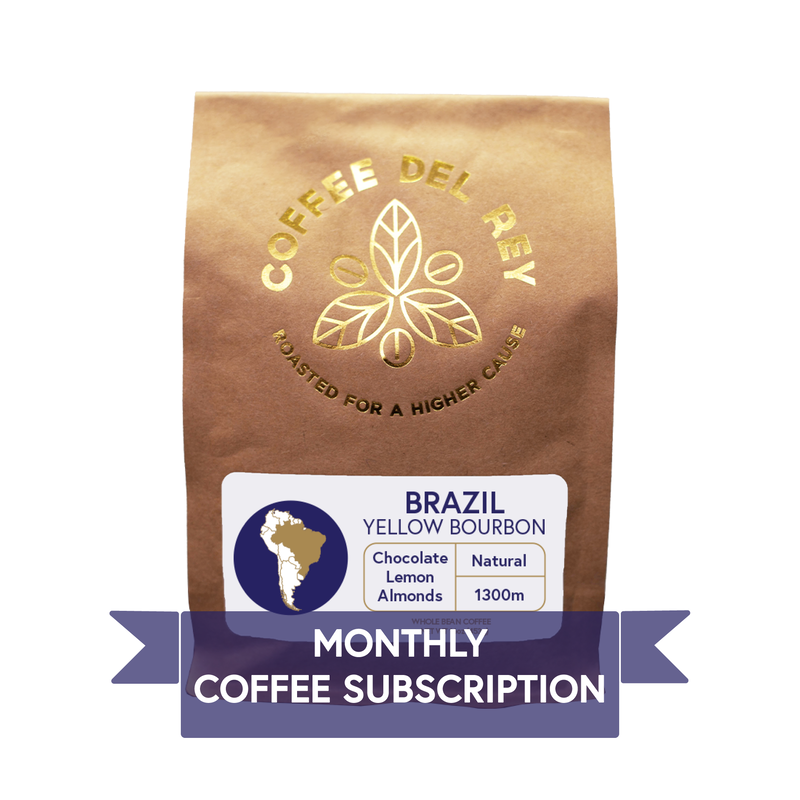Burundi
Hailing from Burundi, Africa, this coffee is from the Umoco Washing Station, located in the province of Kayanza, produced by 518 farmers from the community of Busambo. On average, most farmers hold only 250 trees on roughly a tenth of a hectare. In addition to growing coffee, they also grow crops like bananas, beans, yams, taro, and cassava.
Due to the small size and average coffee yield, washing stations are the primary point of purchase in Burundi. Unlike other coffee-growing regions in Central and South America, where landholdings are slightly larger and coffee-centric resources are more available, most producers do not have space on their property or the financial means to do their wet- or dry-milling. Instead, the majority of growers deliver cherry to a facility that does the sorting, blending, and post-harvest processing of day lots to create different offerings.
Our current Burundi offering was harvested from April-June at an elevation of 1800-2200 MASL in red clay soil. The coffee underwent fermentation, yeast development
3-5 DAYS, and sun dried on raised tables for 25-30 days. While the logistics of buying coffees from Burundi are extremely challenging, we love the heavy figgy, fruity, and lively coffees found there.
This coffee has a juicy body with hints of sweet fig, tangy stonefruits like plums and peaches, and maple syrup. Equally great on a pour-over or french press, try brewing it between 201-203 degrees.
Variety: Red Bourbon
Processing: Natural
Altitude: 1800-2200 masl
Roast Level: Medium-light
Del Rey Espresso Blend
This blend of Brazil and Honduras is complex and sweet as a straight shot, and powerful enough to hold its own in milk. It will not let you down. This is our cafe work-horse.
Can be brewed as espresso or drip, don't let the intention of the blend hold you back. No matter what you will find the brilliant notes of Chocolate, Orange, and Hazelnut with a smooth, rich finish. Brew at a temperature of 202-203 for best results.
Note from the Roaster: If you are brewing espresso at home, make sure to pay attention to 4 major things; Dry Dose, Wet Dose, Time, and Pressure. Here are some guidelines for our Del Rey espresso:
Dry Dose: 18g of coffee in
Wet Dose: 38g of espresso out
Time: 26-29s
Pressure: 9-10bars
Roast Level: Medium
Brazil - Honey Caturra
Brazil is well-known for their huge coffee plantations, similar to corn fields found in the United States. Brazil is the largest producer of coffee, providing a third of the world's supply.
Our latest Brazilian offering is produced by Diogo Tudela, who's family has been growing coffee in Brazil since the 1970's. This beautiful coffee is grown in the Cerrado Mineiro region of Minas Gerais, one of the most renowned coffee regions of Brazil. Currently, the farm permanently employs 42 people and during harvest time which lasts 4-5 months, this number goes up to 60 people. Even with all the technology available, Diogo insists that his coffee be harvested manually, in order to preserve and extend the life of the plant.
Not only does Diogo strive to preserve the land and it's eco-system, he also believes in contributing to the lives of the people who live in the local communities where he operates. Diogo lectures at local schools, on topics such as family values, work ethic, and drug use prevention. He provides school supplies to low-income students, and he also runs an Agricultural Field Program, where kids are able to visit the farm, plant trees and follow along in their growth. Wow, we are blown away by Diogo's contributions to the Brazilian communities he serves and by the legacy he is passing on to the next generation!
We've found this processed coffee to have smooth milk chocolate notes, with hints of honey, molasses, and fig that sweetens as it cools. It has a cream-like silky mouthfeel. We suggest brewing at 203-205 degrees at a 1/16 ratio. Great as a pour-over or french press.
Variety: Caturra
Altitude: 1300 masl
Processing: Honey
Roast Level: Medium
Del Principe Decaf
Origin: Honduras Honey
Roast Level: Dark
Tasting Notes: Chocolate, Nutty, Savory
Processing: Mountain Water
Peru
This Bourbon varietal comes to you from Finca Chririloma, a small farm located in Quellouno, Cusco, Peru. This coffee is farmed 1950 meters above sea level and has been carefully grown and harvested by Q-grader and cup of excellence winner Edwin Quea. Edwin is a second generation farmer who worked hard to become an SCA certified licensed Q grader, later becoming a Cup of Excellence judge for the Ministry of Coffee Production in Peru. Along with cultivating and producing excellent coffee, he and his wife Nory have created a state of the art coffee school and lab. As leaders in their community, they are invested in using their knowledge of business and coffee to educate and collaborate with other farmers and business owners in Peru.
The coffee cherries are carefully picked and fermented for 2 days. It is then washed, selected, and dried in raised beds before finally being sifted for size and then hand-selected for distribution.
The process method is Washed, which enhances its silky mouth feel, with a surprisingly delightful complexity of tasting notes. We found this coffee to have wonderful notes of chocolate, granny smith apples, and orange spice.
We recommend brewing on your favorite method between 203-205 degrees.
Variety: Bourbon
Processing: Washed
Altitude: 1950 masl
Roast Level: Medium-light
Colombia
We are excited to present you with our newest coffee offering from Cauca, Colombia!! This coffee is sourced from a small village named Comedulce or "candy-eater", famous for it's locally produced candy made from the natural grown sugarcane which surrounds the farms.
A predominantly Afro-Colombian community, farmers also double as artisanal gold miners, another tradition inherited from their ancestors. The roads are a labyrinth of unpaved, narrow, winding trails that rise to the sky and descend abruptly like a roller coaster. Historic disenfranchisement, lack of services like water and electricity, and remote difficult-to-navigate roads have made the community an island of coffee among a sea of illicit crops. Staunchly devout, the farmers have stayed true to coffee farming and avoided becoming involved in the drug trade.
We are proud to work with Cosecha Traders, a social impact enterprise that supports smallholder farmers in vulnerable regions of southwestern Colombia, connecting them with specialty coffee roasters in the US and promoting the direct-trade relationships that increase the growers’ economic potential. Through empowering the communities of disenfranchised farmers in remote, conflict-affected regions where specialty coffee is grown, Cosecha Traders works in partnership with them, helping them gain stability in an unstable environment.
Despite the pandemic, social protests, and armed conflict, Comedulce has continued to produce some of the most sought after coffee in the country! We hope that you will enjoy this coffee as much as we have!
This is coffee is a washed-process method, resulting in a clean and juicy cup with tasting notes of cherry, peach, raw sugarcane, and caramel.
We recommend brewing using your favorite method between 203-205 degrees.
Variety: Castillo, Colombia, Caturra
Processing: Washed
Altitude: 1950 masl
Roast Level: Medium
Dominican Spirit Mountain
Our wonderful Dominican Coffee is back on the shelf! We purchase our green coffee directly from Spirit Mountain Coffee Farm. Where their focus is producing high quality coffee in an environmentally sustainable way while honoring the dignity of those who work for them. They are passionate about human souls, loving and serving their neighbors, and making our world a better place.
Spirit Mountain Coffee is estate grown on a 350 acre plantation in the mountains of the Dominican Republic. The plantation is relatively small as coffee farms go, it is located at the prime average growing altitude of 4,000 ft. More than 200 varieties of trees provide the coffee canopy. They are internationally certified organic by UTZ, signaling their commitment to ensure sustainable agriculture becomes a reality.
They maintain social responsibility by caring for the communities near Spirit Mountain and investing deeply in education via the Doulos Discovery School and the Manabao public school. Their coffee is both Smithsonian Bird Friendly and Rainforest Alliance certified, which means that we take of not only the biodiversity of the earth, but the water sources and communities surrounding our plantation.
You can read more about Spirit Mountain Coffee here: https://spiritmountaincoffee.com/about/
Taking great care, the coffee is harvested when the fruit is fully ripe, one cherry at a time. This is a Parainema Washed Select varietal. Processed using a Wet Mill and a non mechanical method for removing the mucilage and dried on Raised African Beds.
In order to get it's full sweet potential with notes of Toasted Almond, Cinnamon Mexican Chocolate, Butterscotch, try brewing at 203-205 degrees at a 1/16 ratio. Great as a pour-over or french press.
Variety: Parainema
Altitude: 1,400 masl
Processing: Washed
Roast Level: Medium


